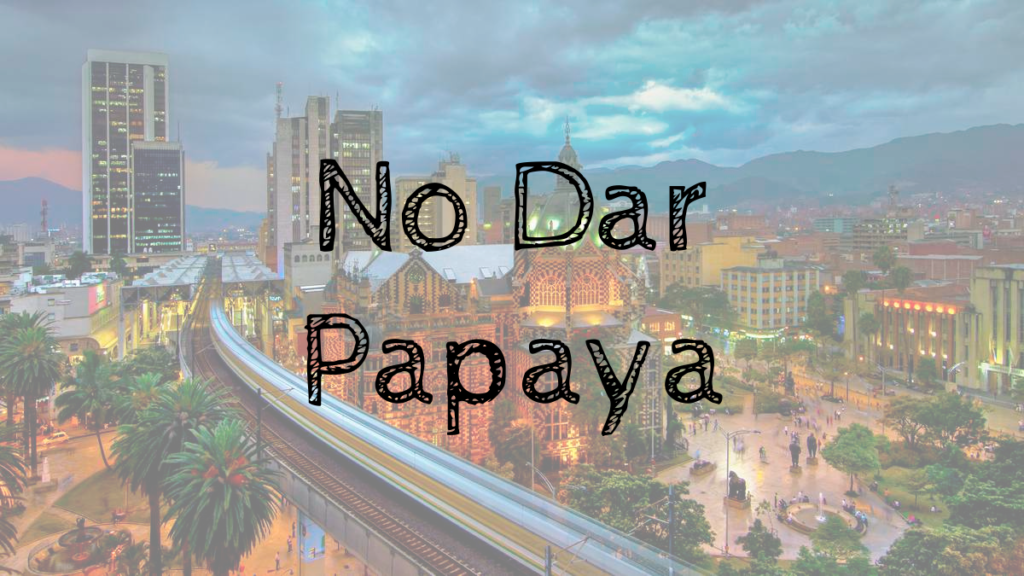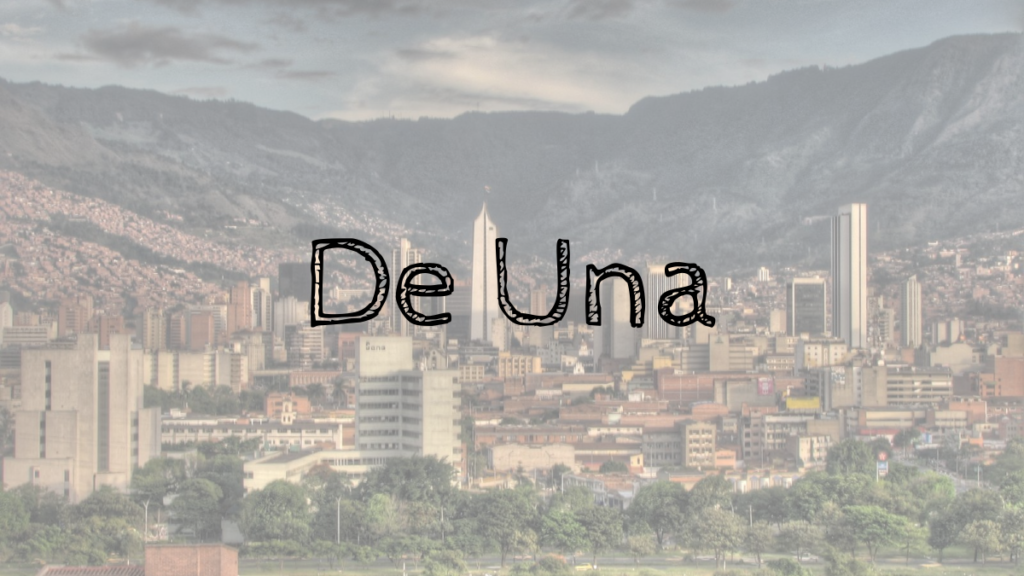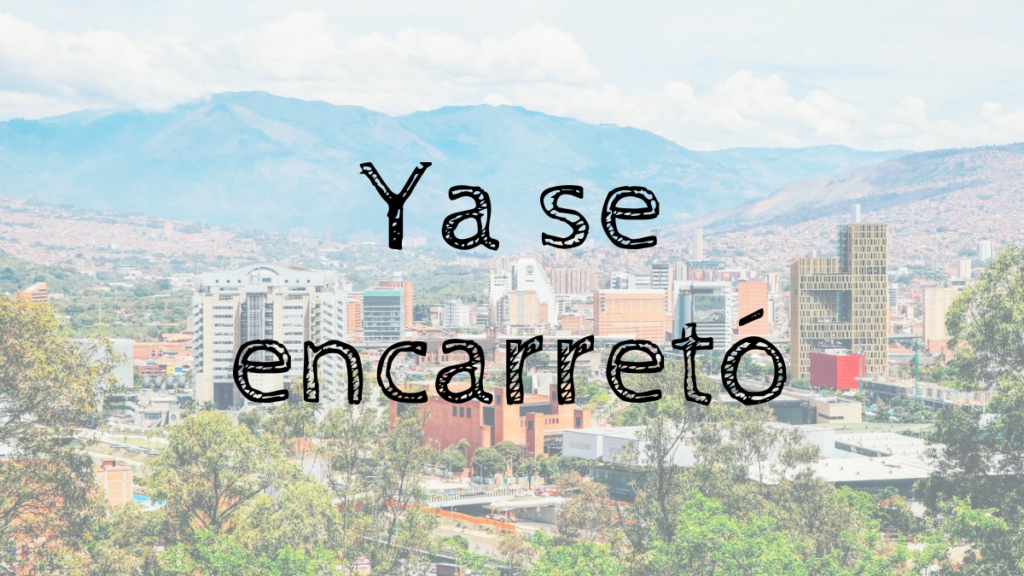Short on time? The paisa people from Medellin use a few different words that you won’t find in your average Spanish language textbook.
If you’ve spent any time studying Spanish, you probably feel pretty prepared for what awaits you when you touchdown in Medellin. However, you may quickly notice that the paisa way of talking is a bit different from what you learned in class!
The good news is that with a little practice (and some expert knowledge), you can start speaking like a paisa in no time at all.
To help you out, I’ve put together a couple of words that you’re likely to hear during your stay in Medellin. Let’s check them out and start fooling the locals into thinking you’re one of them!
No Dar Papaya

One of the first phrases you’ll learn when you land in Medellin is “no dar papaya”.
But…isn’t papaya a fruit?
Well, yes. But, in this case, “no dar papaya” refers to something completely different.
This ultra-Colombian phrase is used to refer to not flashing around expensive items. When you’re “dando papaya”, you’re probably walking with your wallet in one hand and your iPhone in the other.
If you’ve read our guide on safety in Medellin, you know that this is a big no-no (and really, is a big no-no wherever you go).
So, keep your expensive items in your pocket and use your street smarts. If you do, you’re unlikely to get scolded with this phrase!
Ex: ¡No de papaya!
Parce
Another Colombian word you’re likely to hear is parce. This word basically means dude, or guy.
You can use it to refer to a friend of yours or to someone that you have yet to meet. It’s a word that you won’t really hear in formal language, but are pretty likely to hear out and about on the streets of Medellin.
Ex: Que más, parce?
Que Chimba
Another Colombian classic is “que chimba”!
This phrase is like saying “how cool” or “how great”. It’s used to refer to something fun, cool, or exciting that’s happened.
Although you might think the people using it are mad, don’t worry. This phrase is actually a good thing to hear because it means the people you’re with are enjoying themselves!
Ex: ¡Que chimba la película!
De Una

De una basically means “let’s do it” or “okay”. You’re likely to hear people using this word if you’ve invited them to do something.
For example, let’s say you invite someone to go out for coffee. As a response, they say “de una!”
What they’re telling you is, “Yes” or “let’s do it!”
This is an easy phrase to pick up and is a pretty fun one to use. If you’re wanting to sound Colombian, go ahead and throw this word out from time to time.
Ex: ¿Vamos a tomar un café? De una!
Parche
Not to be confused with parce, this means to meet up with your friends. You can use it as a verb or as a noun.
If you use it as a verb, you’ll use it to say “let’s meet”. You’ll have to conjugate it properly, however, so make sure you practice a bit before you use it!
Otherwise, you can use it as a noun to refer to a meeting. That’s often a much easier way to try out this colloquialism if you’re just learning Spanish.
Ex: Parchemos hoy noche.
Vale
When I first started learning Spanish, I had a friend who said “vale” all the time. And, no matter how much I googled, I couldn’t figure out what on earth this word meant!
Well, it turns out that vale is just a way of saying “okay” or “got it”.
Despite being hard to hunt down a definition, this is actually a pretty easy word to get the hang of. Next time you’re talking to someone, see if you can work this into a conversation!
Ex: Seria $22,500. Vale.
Ya Se Encarretó

Another expression you might hear someone use is “ya se encarretó.”
This phrase means is used to refer to someone who’s fallen in love with a specific activity.
For example, let’s say you try out a pole dance class in Medellin and really get into it. Someone could use this phrase on you!
Ex: Hace pole dance todos los días. Ya se encarretó.
Que Peye
Que peye is a phrase used to refer to something that’s gone or going wrong. You can use it to talk about disgust or disappointment in something.
Although this expression can be a phrase in and of itself, you can also use peye as an adjective to describe something.
Ex: La comida es muy peye.
Que Chevere
This is a phrase that’s pretty similar to “que chimba.” This phrase refers to something that’s cool or good.
Like the phrase “que peye”, you can also use chevere as an adjective instead of as an exclamation.
Ex: Los hoteles de Casacol son cheveres.
Qué Caja
This expression is used when something causes a lot of laughter. It’s like saying “LOL,” but paisa style.
You can use it when someone tells you something very funny.
Ex: Ese chiste es bueno. ¡Qué caja!
En La Buena
You’ll hear this phrase very often when someone says goodbye to you or when you do them a favor in some way.
It basically means that someone is in your good books.
Ex: Gracias por prestarme dinero. En la buena.
En La Mala
Colombians generally use this phrase when they mean the opposite of the phrase “En la Buena.”
With this phrase, you mean that someone failed you in something. But, you also use this for things that aren’t serious. You’ll often hear it as a sort of joke telling you off.
Ex: No quisiste ir conmigo a la fiesta, en la mala.
Gonorrea
Okay, I know what you’re probably thinking, but this word doesn’t mean what it does in English!
For people from Medellin, Gonorrea can mean a person who did something wrong or who you don’t like.
It is also used as a negative explanation, a greeting, or to refer to someone with an expression without that person necessarily disliking you.
Ex:
- To say something is cool, you can say: ¡Qué Gonorrea!
- To refer to a friend: ¿Dónde estás Gonorrea?
- As a greeting: ¡Hola Gonorrea!
- As a negative exclamation: ¡Mucha Gonorrea! (The word mucha is used to emphasize)
Melo
This is a word that I think even the paisas themselves don’t know where it came from! The first time I heard it, I asked for an explanation, and no one could tell me what it was all about.
But, basically, melo refers to being ready to do something. Or, it can refer to something being in good condition.
Ex:
- Tu teléfono está melo.
- Estoy melo para la fiesta.
Nea
This is a word that is usually used to refer to someone who is dangerous or who looks bad.
Paisas almost always use it to refer to drug addicts. Other times they use it to insult someone without wanting to offend someone very much.
Ex: Cuidado con ese man porque es una nea.
Care Chimba
You already know what it means to be chimba!
Another word you might here is care chimba. But, don’t get confused, because this is a completely different phrase.
It is usually used among very close friends and is used to refer to someone without necessarily wanting to offend. It’s sort of a teasing way to make fun of someone.
Ex: El carechimba de Jaime no me hizo el favor.
Keni
Another phrase that could leave you confused is keni. That’s because this is actually an abbreviation for ¡Qué nivel!
You can use this word to say that something is “very good” or that what you saw has a lot of quality.
Ex: El concierto de Bad Bunny estuvo muy chimba ¡Qué nivel!
Que Vuelta
The paisas use this phrase a lot when they have to run an errand that will take them a long time. It’s usually not referring to an errand that someone’s excited about, either.
For instance, you could use this phrase if you’re complaining about having to stand in line at the ATM for a long time.
Ex: ¡Qué vuelta la que tengo que hacer cuando voy al centro!
Sornero
Sornero is another rare word, but luckily, this one’s pretty easy to interpret.
You can use it to refer to being relaxed with some people. It’s sort of like saying that you feel at ease.
Ex: Estoy sornero con mis parceros tomando cerveza.
Ahorita
When you learn Spanish, they tell you that ahora means “now.” However, this is probably the worst Spanish lesson I have ever received.
You see, most people in Medellin will tell you “ahorita” when they really mean “in a little while.” This can get pretty confusing, and if you’re not careful, can have you getting frustrated waiting for your friends to show up!
As someone coming from California, I can attest to the fact that in the Mexican community, this gets translated quite a bit. Californians constantly say, “I’ll be there right now,” when they mean they’ll be there in a few minutes.
Anyway, here’s an example so that you can see what I’m talking about:
Ex: Ahorita llego a verme el partido.
Mor
Mor is not a real word, it is actually when the word “Amor” is shortened to refer affectionately to someone.
Some couples say it to each other, but you can also use it with close friends.
Ex: No mor, yo no puedo ir a tu casa hoy.
Mona
Mona is normally used to refer to a woman who is blonde, but for a paisa, no matter your skin color, they may refer to you as Mona to get your attention.
You can also hear people talk about “monos.” No, they’re not talking about monkeys. They’re talking about men who are fair-skinned or blonde too!
Ex: Hola mona, ¿cómo estás?
Oigan a mi tío
This sentence is a bit of a weird one.
First, you should know that Oigan means “listen,” and the full sentence is like saying, “listen to my uncle.”
This paisa phrase works as a way of exaggerating what you’re saying. Although, it’s not one of the more common phrases you’ll hear.
Ex: ¡Oigan a mi tio!, eso no es cierto.
Vamos de Roce
When you are going out for a walk around the city or just hanging out, you can use this phrase. It’s a way to get your friends organized to hang out for a bit.
Ex: Vamos de roce al parque Berrio.
Quieto
This word literally means still or immobile, but you can use it when you want to refer to something that impresses you.
For example, you might use this to refer to the gorgeous landscapes of Guatape!
Ex: ¡Uy quieto!, hubo un accidente en la esquina.
Taco
If you’re thinking that tac refers to a mexican taco or a taquito, think again.
To a paisa, the word Taco refers to a lot of traffic in the city. It’s a good one to throw around when you’re hiking through Poblado at midday!
Ex: Hay un taco para llegar a Laureles.
Charro
When paisas want to refer to something that was wrong or not quite right, they might use this word.
It can be used as an exclamation, or it can be used as an adjective.
Ex:
- ¡Qué Charro! No pude llegar a tiempo a la clase de español
- No seas charro conmigo.
Visaje
I hear this phrase at least a couple of times a day, and it’s so common that you should definitely know what it means if you plan to stay in Medellin for an extended period of time.
Visaje is used to refer to two things. The first is to say that what a person is saying is exaggerated or is bragging (in this case it would be visajoso). The second is to refer to something that is complicated or difficult to do.
Ex:
- Andrés es un visajoso con su celular nuevo.
- Ese exámen de español es un visaje.
Amañado
When you hear this word, you’re probably hearing it in the context of someone asking if you’re happy in Colombia.
This word refers specifically to someone who is very comfortable in a place.
Ex: Estoy amañado en este hotel de Casacol, es muy cómodo.
Mañé
This word can be tough for foreigners because of the ñ in it. However, if you can wrap your tongue around the syllables, it’s actually pretty useful.
This word refers to something that is ugly or in bad taste.
Ex: Esa camiseta esta mañé.
Farra
Farra is basically a word that means party. If you’re already familiar with the Spanish word fiesta, this one shouldn’t be much trickier!
Ex: Hoy voy a irme de farra a 3 Cordilleras.
Prendo
Forget the word drunk, from now on, when you drink, you can use the word prendo.
This word can be used either as an adjective or as a verb. It really depends on the context. Just think of it like the Colombian way of saying “drunk.”
Ex:
- A mi parcero le gusta prenderse con aguardiente.
- Tomé muchas cervezas. Ya estoy prendo.
When in Rome…Speak Like a Paisa
So there you have it! Those are a few of the top words and phrases you might come across while visiting Medellin.
With this guide on how to speak like a paisa, I’m confident you’ll blend in. And, even if you don’t, you can certainly impress your Colombian friends with your new lingo!
If you like this blog, you might like the Casacol Instagram page to keep up with all the new articles. Anything we need to update or correct? Care to contribute? Email us at blog@casacol.co.







